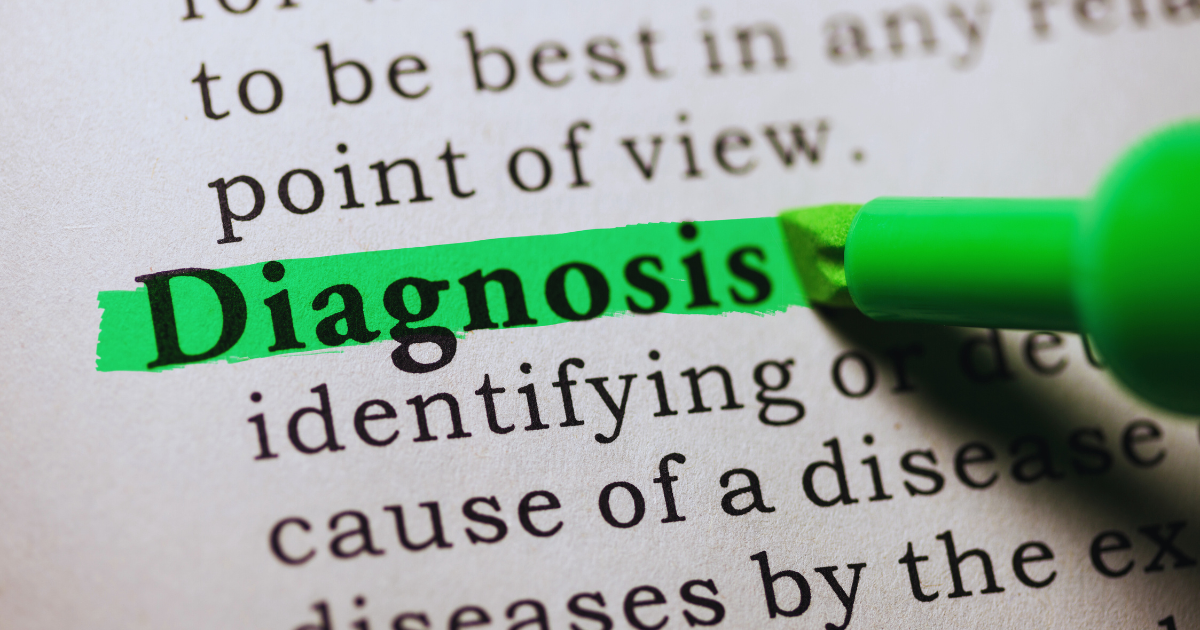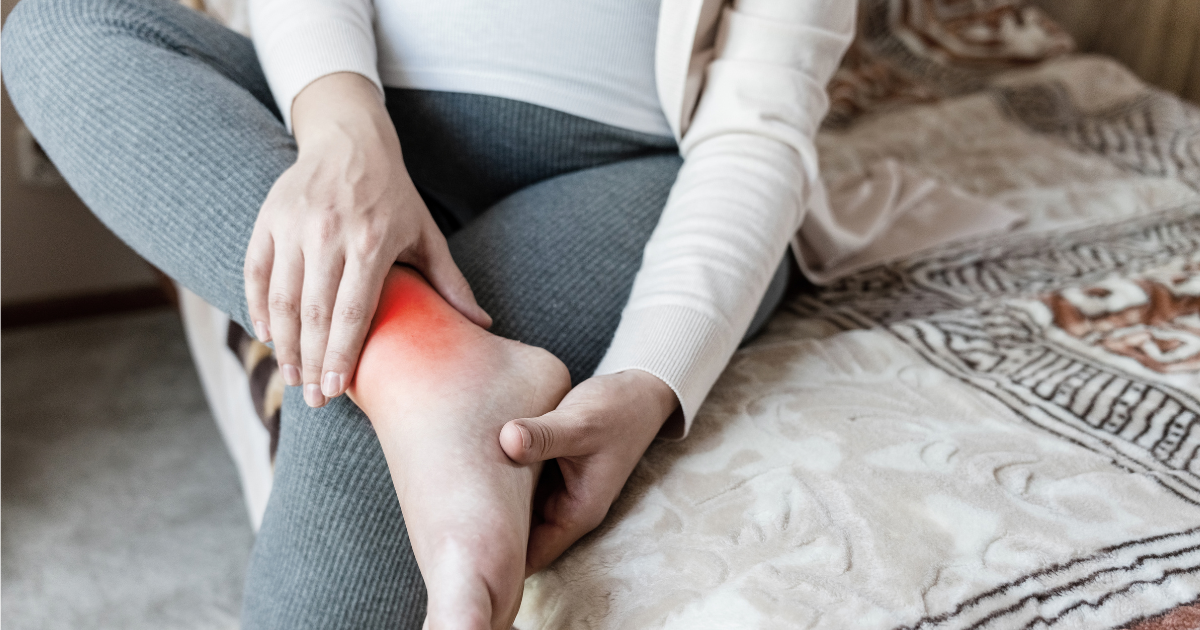Rheumatoid arthritis (RA) is a chronic autoimmune condition that primarily affects the joints, causing pain, swelling, stiffness, and eventually joint damage. Early diagnosis and intervention are critical to managing the disease effectively and preventing long-term complications. If you suspect you may have RA, your doctor will rely on various tests for rheumatoid arthritis to confirm the diagnosis and rule out other conditions with similar symptoms.
In this blog, we will explore the key tests for rheumatoid arthritis and the importance of the established rheumatoid arthritis diagnosis criteria in guiding accurate diagnoses and effective treatments.
1. Physical Examination: The First Step in Diagnosis
Before recommending diagnostic tests, your doctor will conduct a thorough physical examination. This helps to assess your symptoms and identify common signs of RA, such as:
- Joint swelling, warmth, and redness
- Morning stiffness lasting longer than 30 minutes
- Symmetrical joint involvement (RA often affects the same joints on both sides of the body)
A detailed physical exam sets the foundation for further tests for rheumatoid arthritis and helps pinpoint the need for additional evaluation.
2. Blood Tests: Identifying Inflammation and Autoimmune Activity
Blood tests are central to diagnosing RA, as they reveal markers of inflammation and immune system activity that are often elevated in the disease. Here are some key tests:
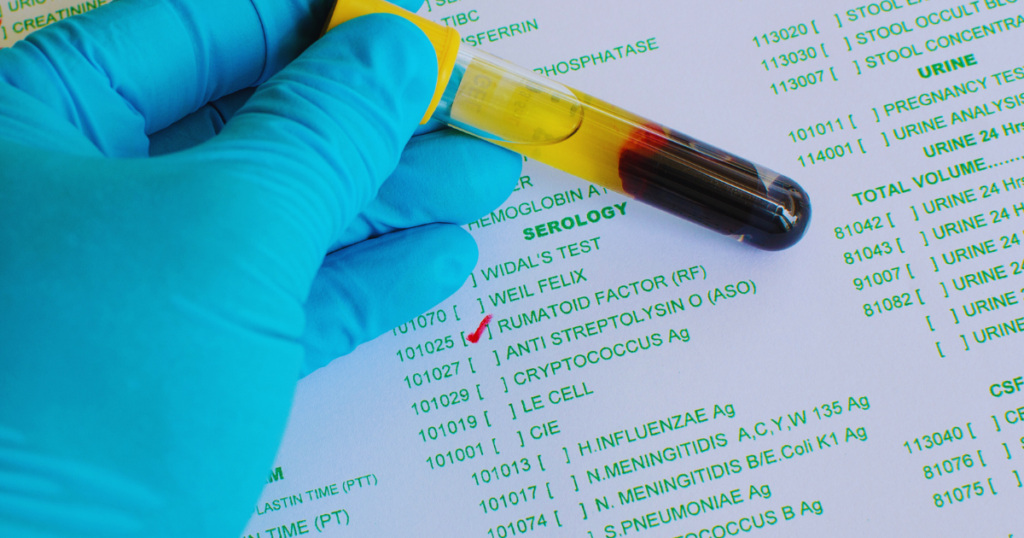
Rheumatoid Factor (RF)
- RF is an antibody commonly found in people with RA, although it can also appear in other autoimmune diseases or healthy individuals.
- While a positive RF result supports the diagnosis, it is not definitive on its own.
Anti-Cyclic Citrullinated Peptide (Anti-CCP) Antibodies
- Anti-CCP antibodies are highly specific to RA and are often present in individuals with early stages of the disease.
- A positive anti-CCP test strongly suggests RA and may indicate a more aggressive form of the condition.
Erythrocyte Sedimentation Rate (ESR)
- ESR measures the rate at which red blood cells settle in a test tube, which is faster during inflammation.
- While elevated ESR levels indicate inflammation, they are not specific to RA.
C-Reactive Protein (CRP)
- CRP is another marker of inflammation that rises in response to an inflammatory process.
- High CRP levels can support the diagnosis of RA when considered alongside other tests.
3. Imaging Tests: Assessing Joint Damage and Disease Progression
Imaging studies help visualize the impact of RA on joints and track disease progression over time.
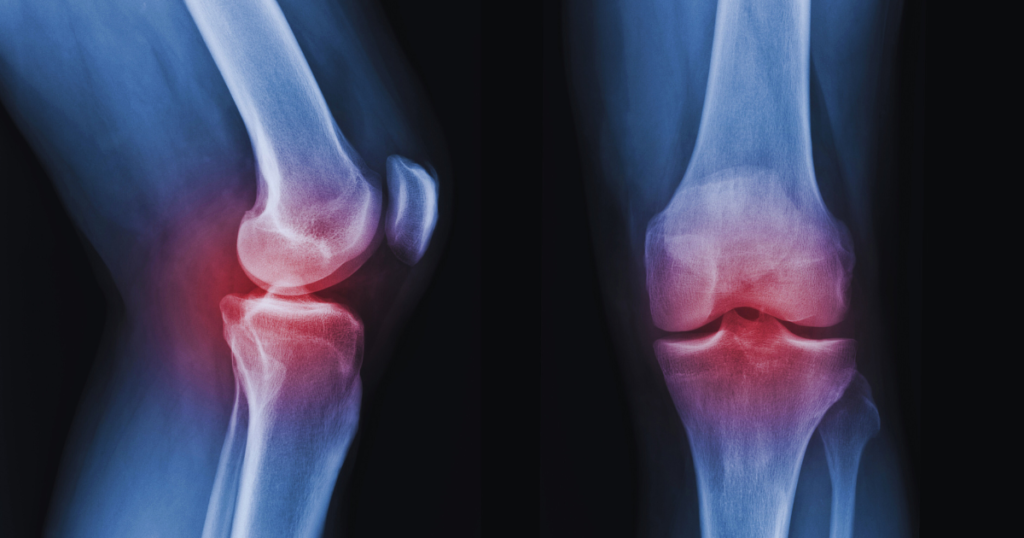
X-rays
- X-rays are often the first imaging modality used and can reveal joint damage, bone erosion, and deformities caused by chronic inflammation.
Ultrasound
- Ultrasound can detect early joint inflammation that may not yet be visible on X-rays, making it valuable for early diagnosis.
Magnetic Resonance Imaging (MRI)
- MRI provides detailed images of soft tissues, including cartilage and the synovium (joint lining).
- It is useful for detecting subtle joint changes and monitoring disease progression.
4. Joint Fluid Analysis: Ruling Out Other Conditions
If joint swelling persists, a joint aspiration (arthrocentesis) may be performed. A needle is used to extract fluid from an inflamed joint, which is then analyzed for:
- Infection or Gout: To rule out other causes of joint inflammation.
- Inflammation Markers: Indicative of RA when white blood cells and inflammatory proteins are elevated.
5. Rheumatoid Arthritis Diagnosis Criteria
- Joint Involvement: Number and type of joints affected.
- Serology: Presence of RF and anti-CCP antibodies.
- Acute Phase Reactants: Elevated ESR or CRP levels.
- Duration of Symptoms: Persistent symptoms lasting longer than six weeks.
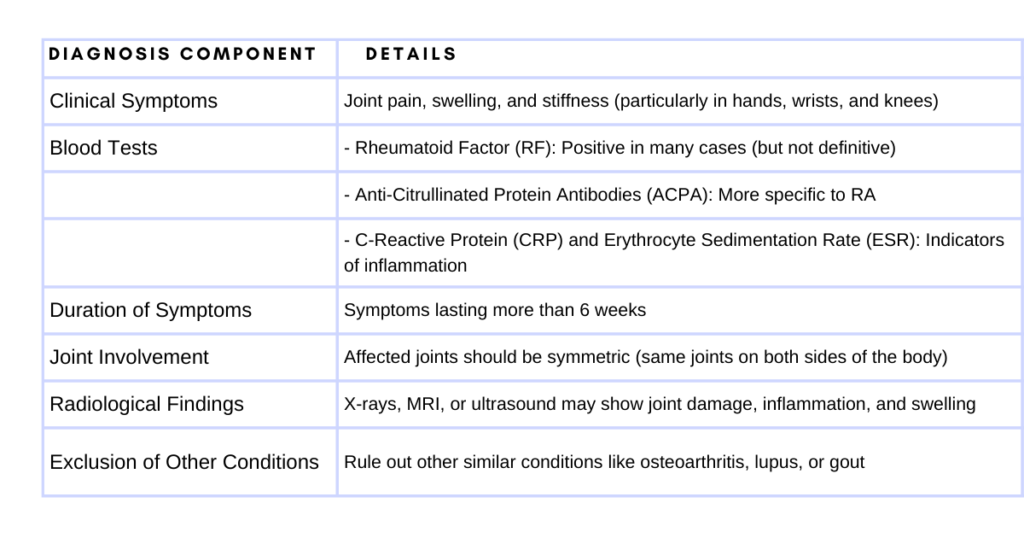
6. Differential Diagnosis: Excluding Other Conditions
Because several diseases, like lupus, psoriatic arthritis, and osteoarthritis, mimic RA symptoms, thorough testing is essential to rule out these alternatives. Doctors use tests for rheumatoid arthritis and the rheumatoid arthritis diagnosis criteria to pinpoint the condition accurately.
Who Should Get Tested for Rheumatoid Arthritis (RA)?
Rheumatoid arthritis (RA) can affect people of all ages, but early diagnosis is key to preventing joint damage. You may be eligible for RA diagnostic tests if you experience the following:
1. People with Persistent Joint Symptoms
- Chronic joint pain, swelling, or stiffness lasting more than six weeks.
- Morning stiffness lasting more than 30 minutes.
- Pain that worsens with inactivity and improves with movement.
2. Individuals with a Family History of RA
- If you have a parent, sibling, or close relative with RA, your risk is higher.
- Early screening can help in preventing severe joint damage.
3. People with Unexplained Fatigue and Weakness
- Constant tiredness, weakness, or general discomfort may be early signs.
- Accompanied by low-grade fever and loss of appetite.
4. Those Experiencing Joint Deformities
- If fingers, wrists, or other joints appear swollen or misaligned, testing is recommended.
- RA can cause permanent damage if left untreated.
5. Women Aged 30-60 Years
- RA is more common in women than men.
- Women between 30-60 years old should be more aware of early symptoms.
6. People with Autoimmune Disorders
- If you have lupus, thyroid disorders, or other autoimmune diseases, you are at higher risk.
- RA testing helps rule out other inflammatory conditions.
7. Those with Positive Rheumatoid Symptoms in Imaging Tests
- If an X-ray, ultrasound, or MRI shows joint inflammation, further testing is needed.
Benefits of Rheumatoid Arthritis (RA) Tests
Getting tested for rheumatoid arthritis (RA) offers several crucial benefits, especially for early detection and management:
- Early Diagnosis & Treatment – Helps detect RA in its initial stages, preventing severe joint damage.
- Accurate Disease Confirmation – Differentiates RA from other joint conditions like osteoarthritis or lupus.
- Better Treatment Planning – Guides doctors in choosing the right medications and therapies for effective relief.
- Inflammation Monitoring – Helps track disease progression and adjust treatment accordingly.
- Prevention of Complications – Reduces the risk of deformities, organ damage, and disability.
- Improved Quality of Life – Early intervention leads to better mobility, reduced pain, and a healthier lifestyle.
If you have joint pain or symptoms, consult Dr. Shukla in Ahmedabad for RA testing and expert care.
FAQs
1. What does a rheumatologist do?
A rheumatologist diagnoses and treats autoimmune and joint-related diseases like rheumatoid arthritis and lupus.
2. What tests are done to diagnose rheumatoid arthritis?
Common tests include Rheumatoid Factor (RF), Anti-CCP antibodies, ESR, CRP, and imaging like X-rays or MRIs.
3. When should I see a rheumatologist?
Consult a rheumatologist if you have joint pain, swelling, stiffness, or persistent fatigue lasting more than six weeks.
4. Are diagnostic tests for arthritis available in Ahmedabad?
Yes, diagnostic tests for arthritis are available in Ahmedabad, and you can consult Dr. Dhaiwat Shukla for expert guidance and accurate diagnosis.
5. Is blood testing for arthritis painful?
Blood tests are minimally invasive and usually painless, involving a simple needle prick.
6. What happens after a diagnosis?
The rheumatologist will recommend a treatment plan, including medication, therapy, or lifestyle changes.
7. How long do arthritis test results take?
Most blood test results are available within 1-3 days, while imaging may take longer.
8. Why is early diagnosis important for arthritis?
Early diagnosis helps prevent joint damage and allows better disease management.
9. Why are blood tests important for arthritis?
Blood tests detect inflammation and antibodies linked to arthritis and other autoimmune diseases.
10. Where can I find the best rheumatologists in Ahmedabad?
Ahmedabad has top-rated rheumatologists at leading hospitals and specialty clinics.
Conclusion: Early Diagnosis is Key
Rheumatoid arthritis is a progressive disease that can lead to permanent joint damage if left untreated. Early diagnosis through a combination of physical examination, tests for rheumatoid arthritis, and adherence to the rheumatoid arthritis diagnosis criteria is vital.
If you experience persistent joint pain, swelling, or stiffness, consult a rheumatologist promptly. They can perform the necessary diagnostic tests and create a personalized treatment plan to manage symptoms and prevent long-term damage. Remember, early intervention is key to living a better life with RA.
Early testing leads to early treatment and better outcomes!

